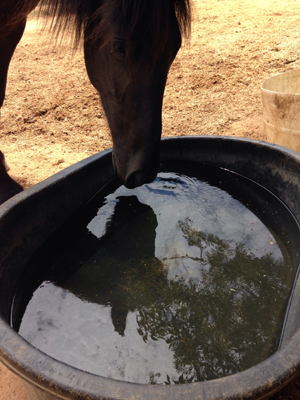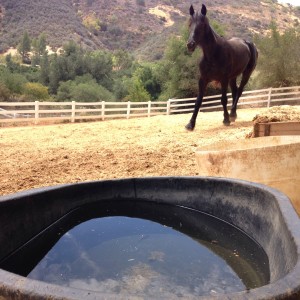How much water should a horse drink?
Depending on who you talk to, horses should drink anywhere from 5–12 gallons of water per day. And, since a horse’s stomach can only hold 2–3 gallons of water or food at any given moment, that amount is spread out over the course of the day. So, taking an average of 8.5 gallons a day, with one visit to the water trough every 2 hours or so, each sip will be about 3/4 gallon—which may sound like a lot, but is really surprisingly low, considering horses’ bodies (which typically weigh about half a ton) are actually three-quarters water.
But hydration (and therefore water) is super important! Horses can go weeks without food but only a couple of days without water. So make sure they have access to water. Not a bad idea to allow them to have some during a ride or workout too.
Why 5–12? That seems like a wide range.
The amount of water a horse needs to drink depends on a few factors:
- Bigger horses need more; smaller horses need less.
- In hotter temperatures, horses need more than average, and in cooler temperatures less than average.
- The more hay and grain a horse eats, the more drinking water he’ll need; if he eats more fresh grasses, he’ll need less.
- Pregnant and lactating horses need a whole lot more. Sometimes up to 25 gallons per day!
So…how much should I give my horse?
You should always give horses access to water when not working. Fresh, clean, and unlimited supplies are a must. A common myth, which has repeatedly been debunked, warns against letting a horse drink after working out until he cools off. This is just a wacky old wives’ tale. Here’s a good article about it and where it may have come from. Horses can drink when hot—not a problem. Just don’t put them away when they’re hot and breathing heavily. If you have a horse that is hot and breathing heavily from a workout, just keep him moving for a while until he cools off, but also allow him to stop for a drink while you do—letting him drink when he wants isn’t just fine, it’s better for him. Basically, whenever your horse wants water, let him have it. Limiting your horse’s access to water can only lead to health problems, including increasing chances of colic by 40%. Here’s a good “Fact vs Fiction” about horses and heat that discusses watering your horse after exertion.
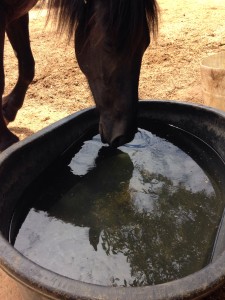 And how should I give it to him?
And how should I give it to him?
There are so many water-delivery possibilities. Automatic waterers of some kind are preferable so you don’t have to keep filling a bucket all day long, and they keep standing water at a minimum. Standing water can be a problem for a whole host of reasons so I say just stick with smaller automatic waterers when you can. Depending on your horse, you may have to do some trial and error to find what he prefers. Some horses don’t like the Push-Paddle Automatic waterers and others love them. Some horses prefer the Bucket type of waterer. In my experience, whatever you choose to try first won’t usually be your horse’s preferred method. Also keep in mind that if you live in a climate that freezes in the winter, checking the water every day is super important. If it ices over your horse can’t drink. And even if you install a water heater to keep it from freezing, you should still check it frequently. I’ve seen these go bad so don’t rely on them to always work.
Do I need to do anything special once my water-delivery mechanism is in place?
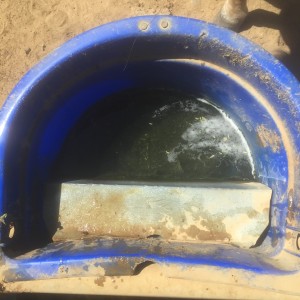 Remember to keep whatever watering mechanism you have clean. Waterers and buckets are overlooked all the time. Check ’em every day and make sure nothing unusual is in them. Ice, falling branches, or leaves can clog or stop automatic waterers from working. Over time, growing grossness will also start building up and sometimes horses will even accidentally poop in their water. And that grossness isn’t just yucky—if you don’t clean the water out, algae can build up and create some major health problems for your horse. In 2013, outside of Las Vegas, NV over 100 elk died after drinking from a “trough containing toxins created by blue-green algae or cyanobacteria.” The algae created a neurotoxin that killed them. Get it? Keep it clean.
Remember to keep whatever watering mechanism you have clean. Waterers and buckets are overlooked all the time. Check ’em every day and make sure nothing unusual is in them. Ice, falling branches, or leaves can clog or stop automatic waterers from working. Over time, growing grossness will also start building up and sometimes horses will even accidentally poop in their water. And that grossness isn’t just yucky—if you don’t clean the water out, algae can build up and create some major health problems for your horse. In 2013, outside of Las Vegas, NV over 100 elk died after drinking from a “trough containing toxins created by blue-green algae or cyanobacteria.” The algae created a neurotoxin that killed them. Get it? Keep it clean.
Need another reason to keep it clean? Worms. If as previously mentioned your horse poops in the waterer or even rubs his butt on it, there’s a possibility that worms will transfer to the waterer. You ever see the lifecycle of worms? Clean it.
Need another? West Nile Virus. Standing water is a great place to grow baby mosquitos. Some of those cary West Nile Virus. West Nile Virus is very bad. Clean it.
How do I know if my horse isn’t drinking enough?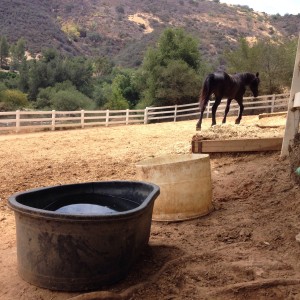
Here are a few signs to look out for:
- A dehydrated horse will lose some skin elasticity. Pinch a bit of skin on the shoulder or neck pull and twist it. If the skin stays tented for more than a second you probably have some dehydration. More than a few seconds and you should probably be concerned.
- Soft tissues will be the first places you’ll see a change. If the eyes and/or gums look dry, white, or purple, this may be a sign of some dehydration.
- Press on the gums for a second and wait for the spot to change from white back to pink so you can see how long it takes for the capillaries to refill. In a dehydrated horse, this may take more than a second.
- Horses with diarrhea have a higher possibility of dehydration, so if you see your horse has loose stool, make sure he has enough water to compensate for the water he’s losing.

